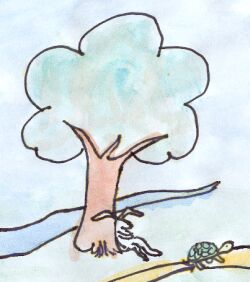
As I think I said in a previous post, Jean de la Fontaine rewrote some of Aesop's fables.
This particular story is much longer than the orignal Aesop's fable which I will post in a day or so.
THE BEAR AND THE TWO COMPANIONSTwo fellows, needing funds, and bold,
A bearskin to a furrier sold,
Of which the bear was living still,
But which they presently would kill--
At least they said they would.
And, if their word was good,
It was a king of bears--an Ursa Major--
The biggest bear beneath the sun.
Its skin, the chaps would wager,
Was cheap at double cost;
'Twould make one laugh at frost--
And make two robes as well as one.
Old Dindenaut,[25] in sheep who dealt,
Less prized his sheep, than they their pelt--
(In their account 'twas theirs,
But in his own, the bears.)
By bargain struck upon the skin,
Two days at most must bring it in.
Forth went the two. More easy found than got,
The bear came growling at them on the trot.
Behold our dealers both confounded,
As if by thunderbolt astounded!
Their bargain vanish'd suddenly in air;
For who could plead his interest with a bear?
One of the friends sprung up a tree;
The other, cold as ice could be,
Fell on his face, feign'd death,
And closely held his breath,--
He having somewhere heard it said
The bear ne'er preys upon the dead.
Sir Bear, sad blockhead, was deceived--
The prostrate man a corpse believed;
But, half suspecting some deceit,
He feels and snuffs from head to feet,
And in the nostrils blows.
The body's surely dead, he thinks.
'I'll leave it,' says he, 'for it stinks;'
And off into the woods he goes.
The other dealer, from his tree
Descending cautiously, to see
His comrade lying in the dirt,
Consoling, says, 'It is a wonder
That, by the monster forced asunder,
We're, after all, more scared than hurt.
But,' addeth he, 'what of the creature's skin?
He held his muzzle very near;
What did he whisper in your ear?'
'He gave this caution,--"Never dare
Again to sell the skin of bear
Its owner has not ceased to wear."'
















